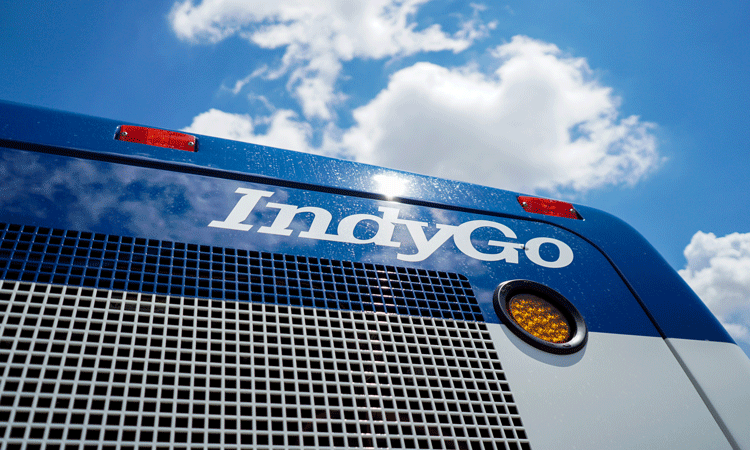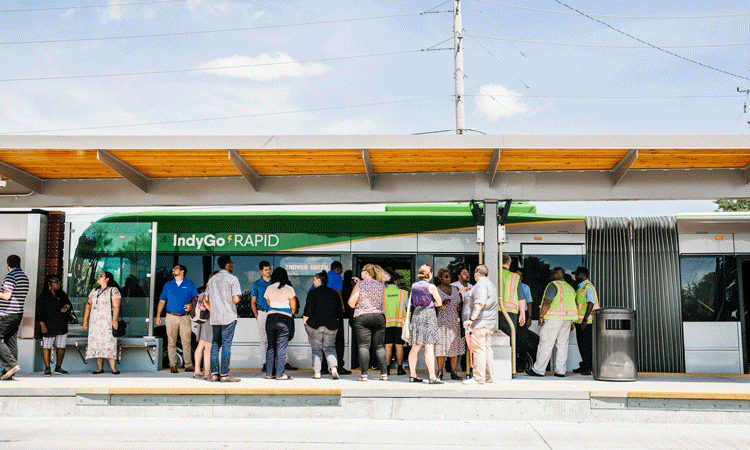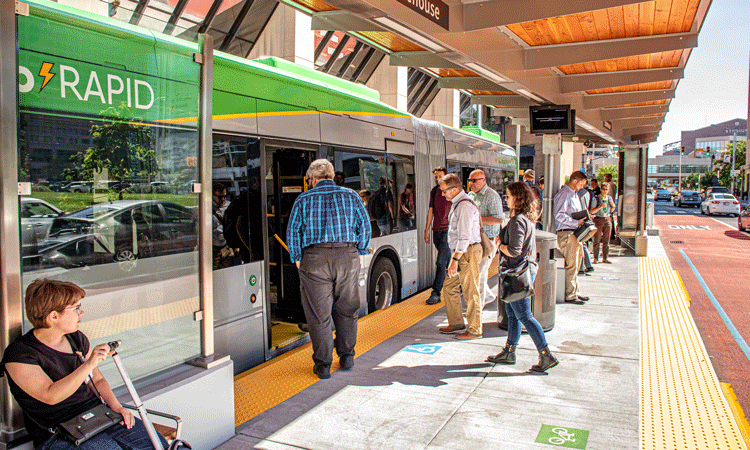IndyGo Foundation: Connecting people through accessible, equitable and inclusive mobility
- Like
- Digg
- Del
- Tumblr
- VKontakte
- Buffer
- Love This
- Odnoklassniki
- Meneame
- Blogger
- Amazon
- Yahoo Mail
- Gmail
- AOL
- Newsvine
- HackerNews
- Evernote
- MySpace
- Mail.ru
- Viadeo
- Line
- Comments
- Yummly
- SMS
- Viber
- Telegram
- Subscribe
- Skype
- Facebook Messenger
- Kakao
- LiveJournal
- Yammer
- Edgar
- Fintel
- Mix
- Instapaper
- Copy Link
Posted: 23 June 2023 | Emily Meaux - IndyGo Foundation, Lacey Everett - IndyGo Foundation | No comments yet
Emily Meaux, Executive Director of the IndyGo Foundation, and Lacey Everett, Chair of the IndyGo Foundation’s Board of Directors, discuss the significance of making public transportation more affordable in a car dependent city like Indianapolis, and provide insight into some of the projects that are currently in development at the foundation to improve access to public transport services.


Credit: IndyGo
Can you tell us a bit about the IndyGo Foundation and its goal to support its community?
The IndyGo Foundation is driven by our mission to help the community thrive by connecting people through accessible, equitable and inclusive mobility solutions”
Emily Meaux: The IndyGo Foundation was founded in Indianapolis in 2018 as a non-profit 501(c)(3) organisation, and we’ve been operating since 2020. I joined in November 2020 as the Executive Director. Our origin story is very unique. We’re the only legislatively mandated transit foundation in the country. We are here because the Indiana State House required us to create a foundation to support transit projects in Indianapolis. But, now that we’re here, we’re learning how to best enhance and support the Indianapolis Public Transportation Corporation (IndyGo) – the transit agency that we support.
The IndyGo Foundation is driven by our mission to help the community thrive by connecting people through accessible, equitable and inclusive mobility solutions. We do this by fundraising for programmes that increase access to public transportation. In a little over two years, we’ve grown to nearly a $1.5 million organisation. We have three full-time staff members who are dedicated to building relationships with non-profit organisations and funders alike. We operate, I like to say, at the intersection between what the community needs, what IndyGo needs and what funders want to support.
As you’ve mentioned, the foundation strives to make public transport services more accessible for the city’s residents. So, what are some of the things that the IndyGo Foundation is doing to make public transportation more accessible and equitable for people across Indianapolis?
Meaux: Indianapolis is a very car dependent city, but about 9% of households do not own a vehicle. There was a 2015 Harvard study that ranked Indianapolis among one of the most challenging cities to escape poverty or to become more self-sufficient. So, the foundation has focused on two primary ways to increase access. The first is through affordability. We do that with bus pass grants to non-profit organisations, where we give free bus passes out. We also support the discounts and programmes that IndyGo already offers, like free rides for veterans and discounts for seniors and students. In addition, we also support other ways that may get more people to ride. All of these things consider the financial access and affordability of transport services. The second side that we’ve been working on is physical access to bus stops.
Remaining on the topic of the financial accessibility of transport services, do you think it is important to make public transportation more affordable and, if so, why?
We believe that access to public transportation is a right, just like access to clean water and electricity”
Lacey Everett: We absolutely do. We believe that access to public transportation is a right, just like access to clean water and electricity. We’re seeking to provide an opportunity to allow more people to access transportation. It’s our greatest tool for equity, and it can be more affordable than other modes of transportation, but it’s not within reach for everyone. It’s also something to consider that, if you’re new in a job and don’t have reliable transportation, it’s going to take a while for you to get to a point where you are able to build up enough funds to afford your transport to and from work, and then, likewise, to and from the grocery store. Thus, a lot of employers are starting to understand that they need to be able to provide their workers with transportation.
We can assist in this by allowing them to apply for bus pass grants. We can accelerate that opportunity for employers to extend these grants to longer than a day, week or month, where they can then build up those funds and get to a place where they can start depending on the funds and depending on that mode of transportation. We want to make sure that access to transportation is available to everyone who would need it but, on top of that, it’s those that would choose it as well, because transportation and mass transit is a very viable way to move around a city community, and we need to make sure that it’s the type of system that everyone is able to get on and choose, and not just be dependent on a car.


The IndyGo Foundation is driven by its mission to help the community thrive by connecting people through accessible, equitable and inclusive mobility solutions.
The IndyGo Foundation recently awarded over 27,000 bus passes to local non-profit organisations. What contribution do you think grants such as this have in encouraging public transport use across the city?
Everett: This bus pass grant, or the Mobility Access Fund, is really one of the first programmes that we launched, because we could see the need based on those employers and agencies that had already been reaching out to IndyGo to access discounted or free bus passes. In order to allow for the expansion of that opportunity, we were able to partner with an employer here at PNC and their foundation. They were able to then provide the funds, so that we could give out 27,000 bus passes to 79 non-profit organisations.
We need to be able to realise that people are going to need to ride transit. We need to make sure that they’re comfortable with it and that they can depend on it”
They applied, then we were able to give out as many bus passes as we could, which then guaranteed that they can provide those to their clients. We also saw organisations using this opportunity to start budgeting, to purchase more passes along the way. So, it’s not just allowing for this opportunity of access, but it’s also getting everyone in the mindset of this being a solution‑based focus. We need to be able to realise that people are going to need to ride transit. We need to make sure that they’re comfortable with it and that they can depend on it. So, that type of culture shift is also a really key focus of this type of programme.
Meaux: I think one thing that we’ve learned over the past two years of doing these bus pass grants is our initial thoughts on the types of passes that were handed out in previous years before the foundation started, which were usually one day passes. So, non-profit organisations would hoard them and give them out to individuals, but they were holding onto them. Thus, we’re trying to shift the mindset within non-profits towards more of a place of abundance. Tell us how many you need, as we want to understand what the actual need is in the community, and if you don’t ask us for everything that you possibly need, we are not going to know.
We’re working on shifting away from just giving it to people for one day. We even have a pilot programme that we’re starting in 2023 that’s focused on workforce development. As part of this, we’ve partnered with some organisations that help individuals to stay employed. Through this pilot programme, we’re trying to see if reducing that financial barrier to transportation for three months will see job retention increase. Will people be able to stay in their jobs longer because they don’t have to worry about transportation? I’m excited to see what we learn from that programme going forward.
On that note, in recent years, especially amidst the cost-of-living crisis, there’s been a lot of debate about whether or not public transport services should be fully fare-free. What are your thoughts on this?
What I do think is more within reach for us in Indianapolis may be developing an income-based fair assistance programme for individuals with the highest needs”
Meaux: So, as far as fare-free goes, I am not the one running the transit agency, so I don’t pretend to understand all of the factors that go into going fare-free. But, from the perspective that I’ve been working in non-profit organisations and the community for over 20 years, going fare-free would have a tremendous impact on the community and the non-profit sector. I’d love to see public transportation being provided for free. But I’m a realist, and I realise that this would require a massive shift to how transit agencies are funded, at least in our community and our state. What I do think is more within reach for us in Indianapolis may be developing an income-based fair assistance programme for individuals with the highest needs.
Everett: I would just add to that, going back to the public-private partnership opportunity that we have by having this foundation in existence. I think that’s the biggest piece, that while fare-free definitely requires a lot more decision making and considerations, I think just being able to minimise the burden in multiple areas by bringing in contributions that are being made by those that are really benefiting from access to transportation. Whether it’s themselves and the corporate office, or it’s their employees.
We can accelerate opportunity by marrying the public-private funds and putting them in the right direction, so that we can take down some of that burden, but also just open up the door to opportunity.


The IndyGo Foundation operates at the intersection between what the community needs, what IndyGo needs and what funders want to support.
What future projects are currently in development at the IndyGo Foundation to improve access to public transport services?
Meaux: So, I mentioned the workforce development pilot that we’re working on. A focus for us in 2023 is really building our capacity as an organisation. We’re realising that IndyGo serves millions of people a year. The types of grants that we can go for are very large. If we were to make all bus stops in Indianapolis ADA accessible, that’s $40 million a year. The size of an organisation to support something like that is much larger than the 1.5 million that we’re at right now. Thus, for this year, our focus is on really growing as an organisation and realising that it does take a fully-fledged non-profit organisation to be able to support transit, and that there are plenty of opportunities for us to keep growing.
We’ve really got to have that consistent funding and consistent wraparound service, so that we can provide these projects through the foundation”
Everett: Emily has the mindset of that community-based organisation building this non-profit from the ground up. I just see so much opportunity in being able to become more aware. I need the community to become more aware of the IndyGo Foundation, but also aware of the opportunities that the transit agency provides. I also want to really focus on the culture shift. I think we mentioned already that we are a very car-centric community. We’re somewhat less dense than you might see other major metropolitan areas around us here in the country. And I think it’s not only unlocking opportunities for people to get on transportation and to get from A to B, but it’s also unlocking a lot of opportunities for everyone to better themselves economically. Transit projects like the ones that we are unrolling here in the foundation is allowing for development along those transit lines, which include housing that’s attainable for people at multiple income levels.
We’ve also worked really hard, for several years, just to get a dedicated funding stream for Marion County. We’ve really got to have that consistent funding and consistent wraparound service, so that we can provide these projects through the foundation. It’s critical to continuing all of these projects, and also getting people on the bus.




Related topics
Accessibility, Modal shift, Passenger Accessibility, Passenger Experience, Public Transport, Ticketing & Payments, Workforce Inclusivity
Issue
Issue 1 2023
Related modes
Bus & Coach
Related cities
Indianapolis
Related countries
United States
Related organisations
IndyGo Foundation
Related people
Emily Meaux, Lacey Everett








